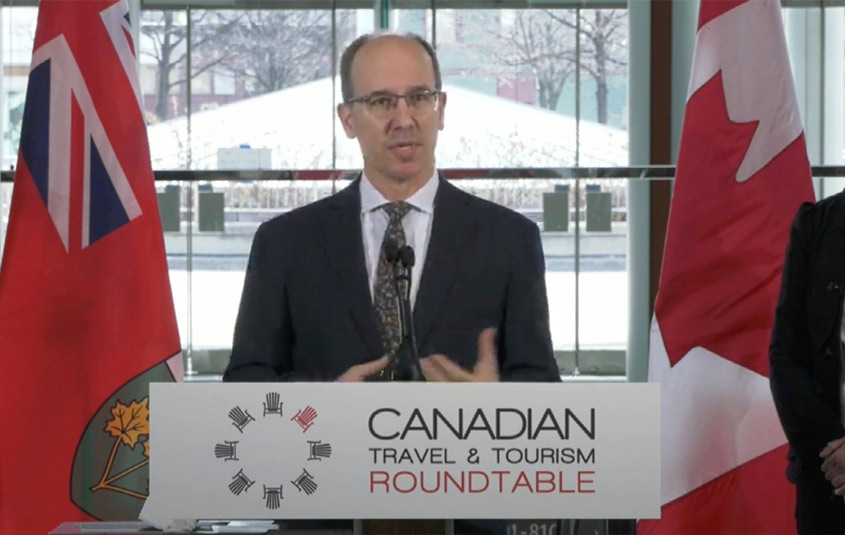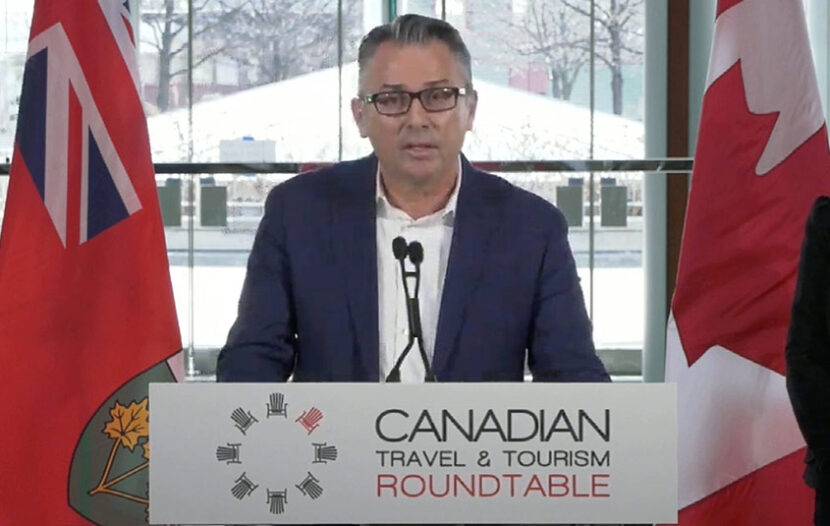TORONTO — The Canadian Travel & Tourism Roundtable is urging the federal government to lift all remaining travel restrictions by April 1.
At a Roundtable briefing today, high-profile executives in the corporate travel world – including Nancy Tudorache, Regional VP, Canada, GBTA; Andrew Weir, EVP, Destination Development, Tourism Toronto; and Patrick Doyle, VP and GM, American Express Global Business Travel – outlined how Canada’s travel rules are decimating business travel, and stifling Toronto’s tourism economy.
While the briefing focused mainly on reviving inbound corporate and MICE travel to Toronto, that may work in the outbound travel sector’s favour in getting travel’s last remaining restrictions dropped.
That’s because inbound corporate and MICE bookings for cities like Toronto are a massive money-maker, and money talks.
As Tourism Toronto’s Weir points out, Toronto’s visitor economy is worth upwards of $10 billion annually. That includes leisure travel plus all the many business conferences and other large-scale events that meeting planners book years in advance.

Andrew Weir, EVP, Destination Development, Tourism Toronto
And if meeting planners are hesitant to book events in Toronto because of Canada’s current travel restrictions right now, that impact will have a “long tail” that will negatively affect the city’s economy for years to come, he said.
EASED MEASURES DON’T GO FAR ENOUGH
Canada’s new eased travel measures, in effect since Feb. 28, 2022, for fully vaccinated travellers, include: the option of antigen tests instead of PCR tests for the pre-arrival testing requirement; a return to randomized on-arrival PCR testing with no isolation while waiting for test results; no isolation requirement for unvaccinated kids under 12 travelling with fully vaccinated adults; and a downgraded travel advisory, to Level 2.
The eased measures don’t go far enough, say many industry groups, including the Roundtable. They also note that Canada’s measures aren’t in sync with other top destinations like the UK.
“We’re calling on the federal government to eliminate the pre-departure antigen test requirement for fully vaccinated travellers no later than April 1, when the regulations are set to be updated,” said the Toronto Region Board of Trade’s Lindsay Broadhead.
“Since the beginning of the pandemic Canadians … have been steadfast in their support for common sense government measures. The time has now come to reward those who have made many sacrifices to get where we are today. We’re confident we can emerge from this with a vibrant and thriving regional economy. But we need government to do their part as well,” she said.
The GBTA’s Tudorache noted that business travel in and to Canada contributes $40 billion annually to the Canadian economy, and supports more than 600,000 jobs.
After two years of the pandemic, “entire segments of the economy have successfully reopened, but we’ve seen little to no progress for the travel and tourism industry. We’re still struggling.”
Requiring any sort of test results, either antigen or PCR, for travelling coming into or returning to Canada, “are a barrier to travel,” Tudorache adds. “These measures simply do not permit flexibility or schedule changes. They add tremendous uncertainty.”
And as long as these measures are still in place, “our forecast estimates that business travel to Canada, subject of course to further lifting of travel rules, will not recover to pre-pandemic levels until 2024.”
“NOTHING SHORT OF CATASTROPHIC”
AmexGBT’s Doyle put it bluntly: “The impact of the pandemic on business travel is nothing short of catastrophic. And the current travel restrictions are limiting our ability to bounce back.”
He added: “Toronto is currently being overlooked for international events and conferences by organizers … future events are being planned elsewhere.”
Over the past two years, 400+ big conferences and events have been cancelled in Toronto, he noted. “This represents billions in losses for hotels and restaurants, and other segments of the tourism industry. And without these events, business travellers are just not coming to Canada.”
While rapid antigen tests are less expensive and more accessible than PCR tests, “they pose a cost to travellers and promote a degree of uncertainty. The current restrictions do not provide certainty.”
Doyle added: “There’s no scientific reason that justifies travel being singled out as the only activity requiring testing.”

